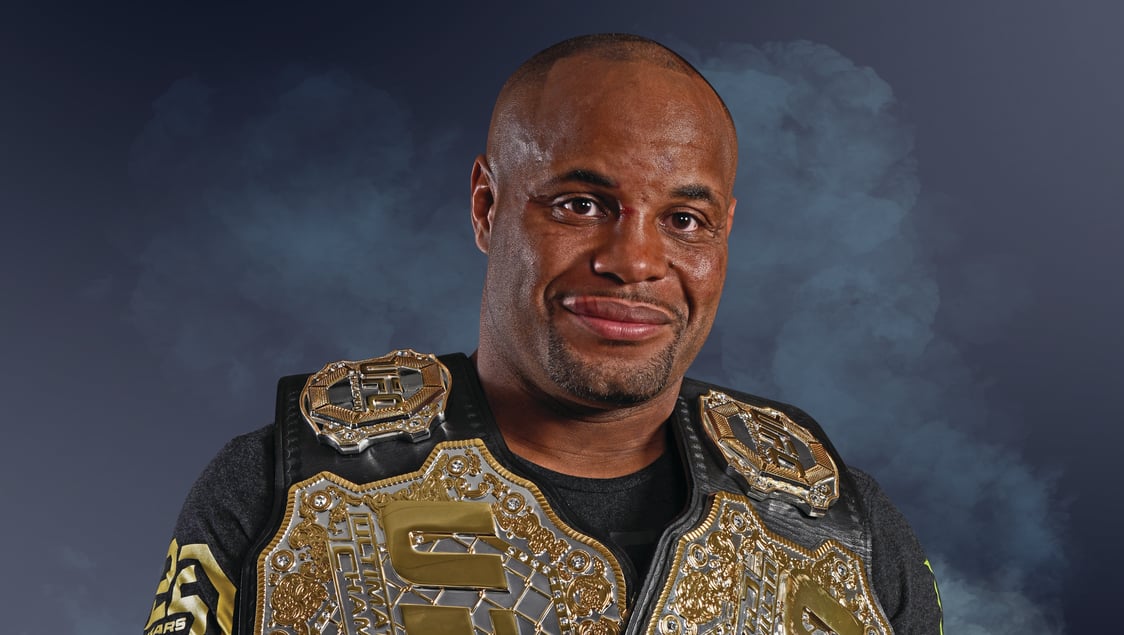
Issue 171
October 2018
It's a story of loss and redemption that a comic-book writer might consider too far-fetched. Daniel Cormier has transformed his career from nearly-man to all-time great and overcome tragedy to find a degree of serenity in his personal life as well. All hail DC!
Daniel Cormier was, for years, seen as the nearly-man, the man who couldn’t quite get it done.
A fourth-place finish at the 2004 Olympics, defeat in the NCAA finals and World Championship semi-finals, not to mention the two UFC losses to Jon Jones.
All that changed on July 7, 2018, at UFC 226. Now, Cormier breathes the same rarefied air of the sport’s true elite. His first-round KO of Stipe Miocic makes him only the second man in UFC history to simultaneously hold titles at two different weight divisions, the other being Conor McGregor.
Now he’s spoken of as a contender for the greatest of all time.
What makes the story even more like something we might more readily expect to read in a comic book is that, less than a year ago, Cormier was at his lowest ebb professionally. Having suffered another defeat to Jon Jones, he gave an emotional, tearful, post-fight interview to Joe Rogan. His race seemed run.
“People saw that and wondered what was going to come of me,” he recalls. “What is going to come of this guy, who on July 29, 2017 was physically, emotionally and in every sense of the word, broken.
"Then for Jones to test positive again, man. People saw me cry in the Octagon and maybe they thought I didn’t get a fair shake. People thought maybe they shouldn’t be booing this dude. Maybe this is the guy we should be cheering for. Then to see me bounce back the way I did. I think people rooted for Jon. You wanted the redemption story. You want to see if a guy can come back better, but ultimately for our rivalry, I became the redemption story. They saw me broken and then to come back and dominate Volkan the way I did and then become the heavyweight champion. I think my story is the one that has become the story of redemption.”
He’s right. Cormier’s professional and personal stories are both ones of enormous redemption. The professional redemption received its perfect image when, following the defeat of Miocic, Cormier ascended to the top of the Octagon, and sat there as king of all he surveyed, one belt wrapped around his waist, the other over his head, his face beaming with joy and satisfaction.
“It was unbelievable,” he says, as if still unable to fully comprehend his achievement. “I saw Conor McGregor do it and thought it was just special. Conor is such a lucky guy to have accomplished something so unimaginable. I remember seeing him atop the Octagon with his belts. For all that he does, he just looked truly happy in that moment.
"Man, any person that can accomplish something like that, what a tremendous feeling. When it was happening to me I just thought ‘Wow. I did it.’ Not that it’s bigger but it’s literally bigger, right? With being the light heavyweight and heavyweight titles. It was exciting to be part of such elite company.
"I feel like the UFC production staff, who I feel are the best in the business, they captured a great shot of me on top of the Octagon. It’s very close-up and then the camera pans out and it’s me on top of the cage and you can almost see the whole crowd. Those are the types of memories and moments that I will never forget.
"The joy of my family… I watched that "Thrill and the Agony" by the UFC and I see my mom and my dad standing there going crazy. Then I see my wife sitting there with her hands clasped as if she was praying. When I asked her how she couldn’t be up celebrating she said she was just sitting there wondering if it was done. She couldn’t believe it was done. When you start to think of two-weight-class champions you start to think and say some of those names – BJ Penn, Randy Couture, Georges St. Pierre, Conor McGregor, and Daniel Cormier. Is that not insane when said out loud?
“It’s a big deal for me,” he continues. “Not only because I won the biggest and baddest belt in the sport but for me, it takes on extra meaning because of my history with (Jon) Jones and winning the belt after he was suspended. Then losing and getting the belt reinstated. It’s really good to have something completely separate from him. There can be no question in regards to what this time means.
"That’s probably one of the most important aspects to me, outside of the historical aspect. The fact that people can’t say this isn’t real. They have to respect me for what I did. Honestly, it is kind of crazy because the reality of me at heavyweight was never truly seen through. I left the division when I was undefeated and ranked number two in the world. I felt like that journey has been completed now as I became the heavyweight champion.”
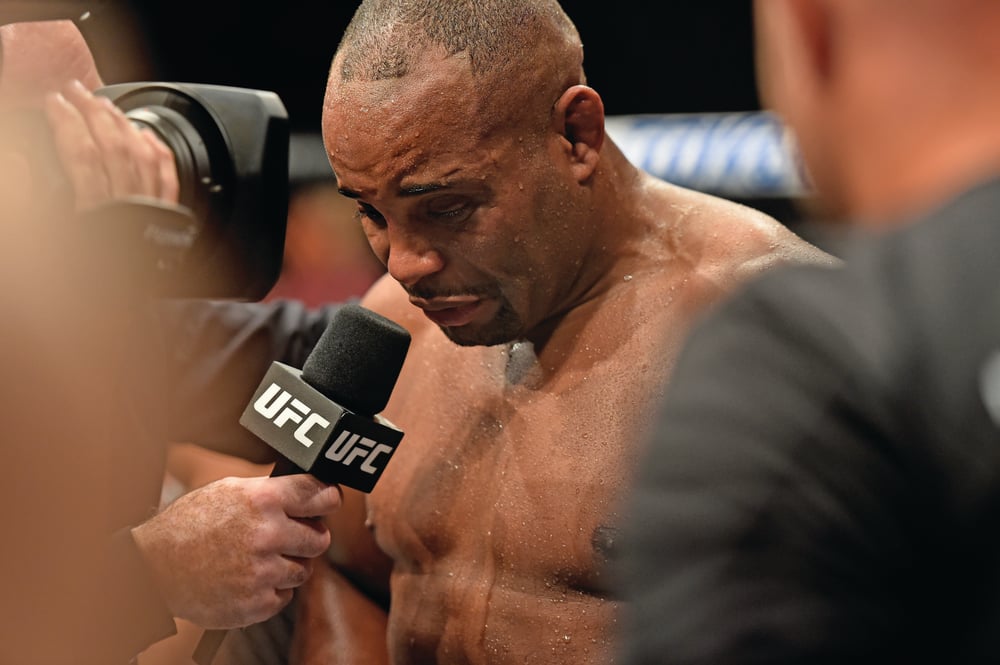
The manner in which he completed it brooked no argument. Despite conceding height, reach and weight to Miocic he finished him emphatically.
“We were getting into the clinch a lot,” he remembers.
“I was looking for an opening. When I limp armed he did what you expect a wrestler to do. He reacted like a wrestler would react, by circling back away from the underhook. That led him into the right hand. It landed clean and he went down. I didn’t think it landed as hard as it must have, to put him down like it did. I’m lucky it happened that way because I broke my hand on that punch.
The disappointment of suffering this recurring injury – this is the fourth time he’s broken his right hand – has not tarnished his memories of that night.
This break won’t require surgery and he’ll be fit again for his next fight, which it seems will be with Brock Lesnar, who made his way into the Octagon in the post-fight melee and threw down the gauntlet.
“That was a surreal feeling in the Octagon that night,” reflects DC. “You are arguing back and forth. You are jibber-jabbering back and forth. I was legitimately having a WrestleMania moment right there.
"But that’s it. Now Brock is no longer a buddy of mine. Brock is no longer a celebrity superstar. Brock is an opponent. All of that surreal shit and those fuzzy feelings I felt back then are gone. Now it’s time for me to go in there and beat him up. When he steps into that Octagon it’s not sports entertainment. There is no selling. There is no putting him over. I am going to kick his ass.
“I believe it will be a good fight,” he expands. “It will be a tough fight. He and I will mix it up and we will go at it for as long as he can last. Ultimately, I feel that I am the better mixed martial artist and that will show itself. I know he is a big, strong, powerful guy. He can really wrestle but this is a mixed martial arts fight. I have to go in there and do what I do and I will be fine.”
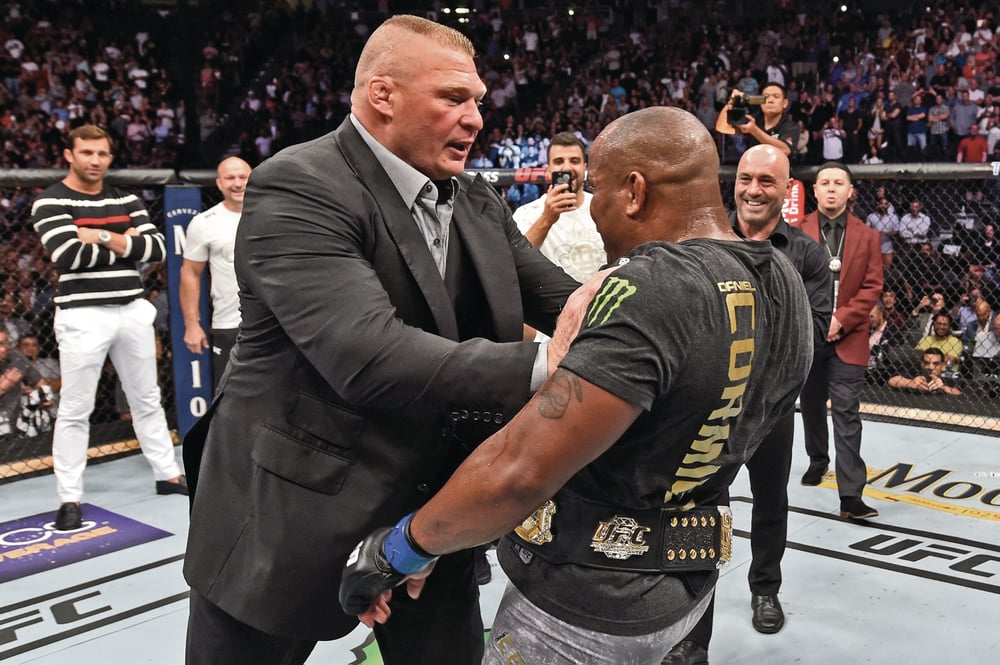
Naturally, Lesnar is not alone in wanting a piece of the newly crowned champion. Fighters have been coming out of the woodwork to challenge him recently. From Nick Diaz, to Shogun Rua and everyone in between. Cormier is in no doubt how this will play out.
“I will beat the shit out of them,” he declares with believable menace. “They need to realize that. I’m not playing. You have these little guys saying they want to fight DC. You really don’t. You think you want to until you are in there with me.
"You realize you don’t want to wrestle. You realize you don’t want to work that hard. You don’t want a guy that is walking you down and constantly in your face. They don’t really want to fight me. It seems like the cool thing to do right now.”
Reflecting his all-round natural talent, Cormier could have made it as either a wrestler or a footballer. In fact, it was his interest in gridiron that led to his taking up wrestling seriously. And it was a fight in a parking lot, aged 11, that got it all started.
“We were playing football right in front of the high school,” Cormier recalls of his upbringing in Lafayette, Louisiana. “Back then nobody had kicking tees. If you had a kicking tee, you were the man! My friend was the only one with a kicking tee and he would take it away every time he got mad at us. So we get in this fight in front of the high school and the wrestling coach comes out and said that we should be doing something positive with ourselves instead of going down the wrong road like most kids in the neighborhood. We all started wrestling but I was the only one who stuck with it.”
Stick with it he did, enjoying an outstanding high school and college career and becoming a two-time Olympian, the highlight being a fourth-place finish at the Athens Olympics of 2004. Those times are still clearly cherished memories.
“It’s unbelievable, man,” he smiles. “It’s something I dreamed of as a kid. In 1996 I watched Kendall Cross, Tom Brands and Kurt Angle win gold medals in Atlanta. As a high school kid I said then that one day I wanted to be an Olympic Champion.
"When it happened it was almost a sense of disbelief. I still look back and think ‘Wow, I went to the Olympics.’ I can’t really give you a good idea what it was like, other than the sense of pride, knowing that seven guys in the country get that opportunity. I wasn’t representing AKA or Oklahoma State, I was representing the United States of America and that’s a great honor.”

In 2008, Cormier was named captain of the US wrestling team, but proved unable to compete having suffered kidney failure as a result of drastic weight cutting.
His athletic prowess, however, meant he might never have gone down the wrestling route at all, having been an all-state linebacker in high school and offered a scholarship to play at LSU. Had he never wondered how far he would have gone as a footballer?
“No,” he replies without any sense of regret. “The difference in that was that the position they wanted me to play was not right. I didn’t think I was fast enough to chase behind linebackers and chase down wide receivers.
"They wanted me to play strong safety. I wasn’t smart enough to know that strong safety was just another linebacker. I can’t chase down Randy Moss! I would get embarrassed. And back then, LSU wasn’t the LSU it is today. It was a little different back in 1997 than it is now.”
DC, now 39, has experienced every high and low personally and professionally it is possible to imagine.
His experience across different sports, different disciplines with differing degrees of success have left him with an admirable temperament, both ambitious and philosophical about the nature of victory and defeat. His current popularity, he knows has been hard won.
“Ultimately people appreciate success,” he explains.
“You can change their opinions and ideas by just winning, honestly. But you can also do it by staying the course. With all the issues other guys have had I have just been consistent. I have been consistently there, fighting through the good and the bad. When I cried after I lost to Jones the second time I think a pocket of people laughed and thought I was a joke, a crybaby but I think the vast majority of people thought ‘Wow, this dude put so much into this that it broke him.’
And he knew had he lost at UFC 226, it might have defined his reputation in a way that would have been grossly unfair.
“It was said before the fight ‘Daniel, you have been here before but you have never really gotten it done,’’ he recalls. “I was fourth at the Olympics. I lost in the Olympic semifinals, where if I win I go wrestle for the gold medal. I lost in the NCAA finals. I lost in the semifinals of the World Championships. I lost to Jon Jones. What is going to happen if I don’t do it now?
"I might have gone down as the most successful bridesmaid of all-time, never got the husband. I answer those questions and doubts like this – the only reason you have seen so many of my failures is because I have given myself so many opportunities to do great things. Nobody said ‘Daniel, you are a great guy. We are going to have you wrestle for some of the biggest titles in the world.’ Those things aren’t given. They are earned. I earned the chance to try to do great things. I fell short many times.
Finally at UFC 226, I was able to capitalize.
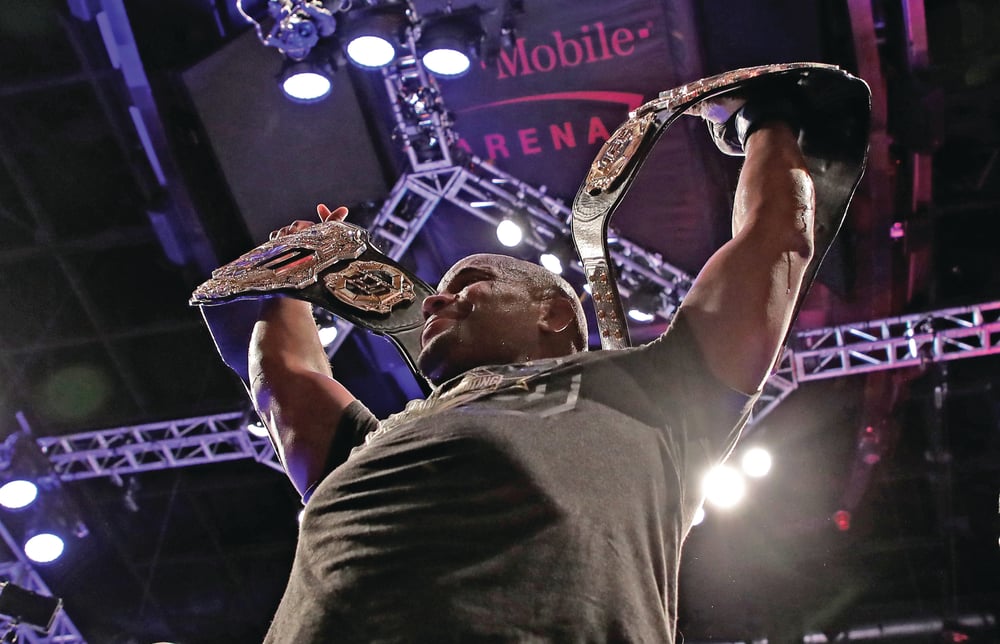
The craziest part about it, for as big as the Olympics are and NCAA Tournaments is, those stages weren’t as big as the UFC. Those events were on a massive stage but I got it done when the stakes were the highest and the lights were the brightest to become a two-division simultaneous champion.
"It’s almost like all those close calls were building to that moment of total accomplishment.”
He would hardly be human if those doubts hadn’t started to crowd in during the build-up to the fight.
“I tried not to think about that,” he explains. “I believe if you start to give yourself an out you will take it. We are humans. When you run, you start thinking about how tired you are, how your foot hurts, how your back bothers you. Most times your back feels like it hurts you much more than it actually does so that you can stop. I try not to give myself those options.
"I do have moments of doubt every time I fight. Before the Stipe fight I was in the locker room thinking about how much I hate the anxiety. I was thinking win or lose, I’m done. Forget this shit. I don’t need this at 39 years old.
"I don’t need to deal with this anxiety. I don’t need to deal with this shit anymore. I was giving myself reasons to lose! The moment that music hits and the moment I walk to the Octagon, there is no place I would rather be. It’s the in-between time when the competitive nerves are at their highest, when it’s still not time to perform, then you start to feel nervous.”
There is real honesty in Cormier’s self-reflection, no more so than when the subject turns to the role of luck in shaping sporting careers and lives.
“In wrestling people say luck is when preparation meets hard work and opportunity and it all comes together,” he reflects. “That’s how I look at luck. I look at luck as having an opportunity.
"I had a family, as a young boy in Louisiana that supported me. I’m not the most talented guy from my hometown. There are people that are more talented. They didn’t have structure in the household to propel them to the things that are bigger. They didn’t have a dad like my stepdad that showed that hard work was everything. No matter how talented you were it was never going to amount to anything without hard work. I watched that man work 14 hours a day in multiple jobs.
"I was lucky to have that and a family now that supports my dream. To have found my wife at the time that I found her, I met her way back in 2010 long before I accomplished anything. To find a person that shares your dream to help you get to where you are. While I’m out fighting and trying to make this living in this way, I know at home everything is in order.
"It does take luck. It could have been someone else. It could have been someone who didn’t have the best intentions. It could have been someone who didn’t live for family. It takes a lot of luck. Those are things I can’t prepare for. Those are things I can’t work hard for. In terms of hard work, I will always do that but some of those other things are out of your control and in those instances you do need luck.”
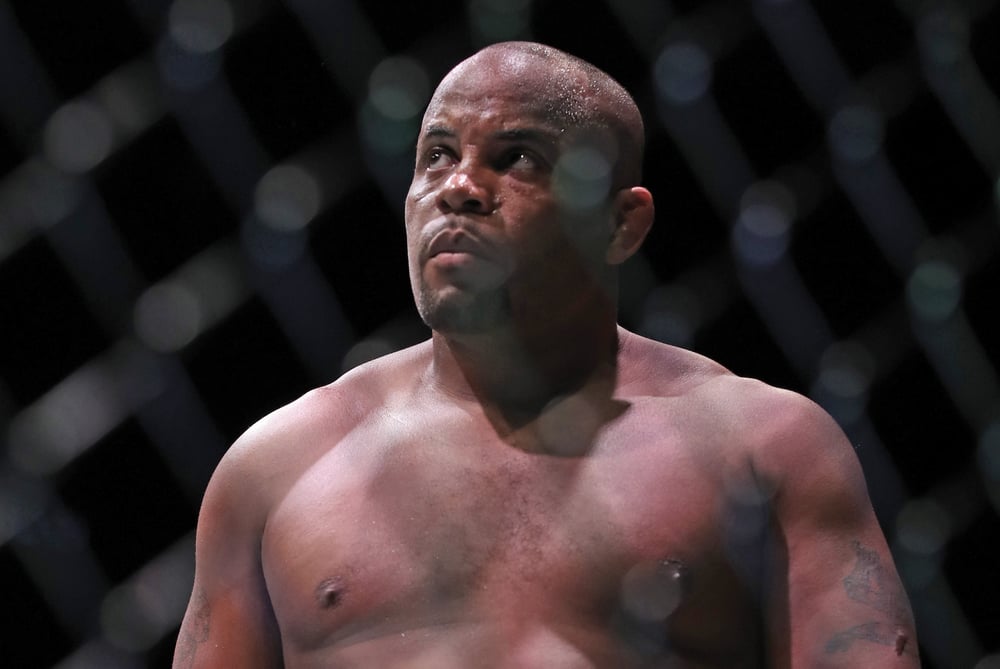
If professional redemption is now Cormier’s, the same is true, mercifully, in his private life. Cormier’s personal tragedies are, to an extent, well-documented. How his father was shot dead on Thanksgiving Day, by his own father-in-law when Cormier was just a seven-year-old boy.
The loss of his 18-month-old daughter, Kaedyn in a car accident. Blows which would have broken many, a boy or man, he has somehow survived.
“It’s hard,” he replies with a world of understatement.
“The first and most important thing is that you need a very strong support system. That is something I have always had. My family is really strong and always behind me. My ex-wife is strong and behind me back when we were going through the loss of our daughter. My wife and my kids are my support system now. You have to believe, you have to have faith.
"My mom always preached to me that I will never get more than I can handle. We all bear a cross at some point in our lives. We never know when it’s going to be but it’s never going to be too heavy. You will always be able to handle it and I really believe that. There were days when I thought I couldn’t bear it but you have to stay positive. I lost my daughter Kaedyn and it took years and years to have any more kids. Now I have my son Daniel, Jr. and my daughter Marquita. I’m just blessed.”
For Cormier, the end of his professional career is in sight. It’s a happy ending all true fight fans would want for a man who deserves it more than most.
“March 20th 2019 is my date,” he explains, with reference to the date of his 40th birthday. “I won’t fight past that date. That’s it. It’s over. I said when I started this thing that I wanted to try to be one of the best fighters of all time. When I met my wife I said I would go to forty. Then the kids started to get older. She said I said at 35 and every year since I said maybe one more year. I’m telling you, at forty years old, I’m done. It’s different now.
"If I told her 35, I was just starting to fight. When I met her I had one fight. I had no money. I had no security. I had none of that stuff. Now I know with what he have accomplished, with the money we have made, with the jobs and investments to help us live our lives afterward, at forty I can just be Selena’s husband and Daniel and Marquita’s dad and that’s enough.”
If he makes it through to that point undefeated and still in possession of two titles at different weights, he will surely be remembered as one of the greats. What does he hope his legacy will prove to be?
“I want to be remembered as one of the greatest to ever do it,” he declares with admirable candor. “ I feel that I am the greatest of all time but I understand I lost. I lost twice.
I don’t debate that. But with all the extra shit that came with those losses, I did it the right way. I have never been in trouble. I have never been caught cheating. There are no excuses for me. I believe that I should be in the conversation.”
...
